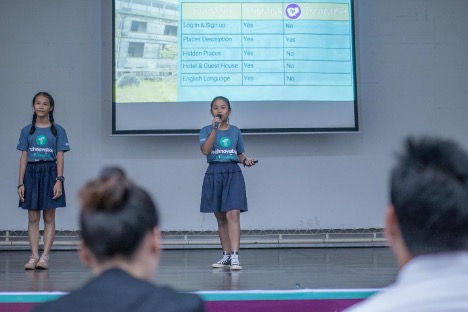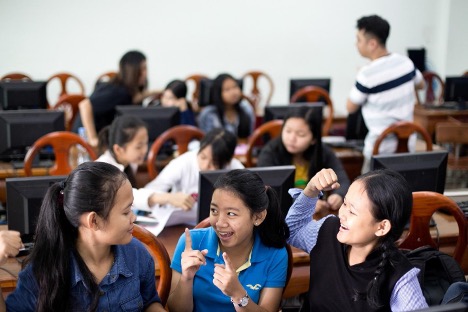Let us know what type of content you'd like to see more of. Fill out our three question survey.
Sustainability in Action: Technovation Cambodia 10 years on
Nov 21, 2024
Searching online for the word “sustainability” yields 500+ results on the U.S. Agency for International Development’s (USAID) Learning Lab website, 5,000+ results on USAID.gov, and a whopping 80,000+ results on the Development Experience Clearinghouse (DEC). Developing and implementing sustainable interventions—those that continue beyond the life of the donor-funded programs that designed, implemented, and/or funded them—is a core focus of donors and implementing partners around the world. However, given the short time horizons of many programs, the truth is that we often do not know what happens to initiatives after funding them.
Today, we highlight a sustainability story that USAID also recognized in its Enduring Results Study 4.0—the 10-year anniversary of Technovation Cambodia (five years under the Development Innovations (DI) project and five years under the leadership of Cambodian organizers with no bilateral donor support).
In 2024, Technovation is stronger than ever in Cambodia, with:
- 2,737 girls registered for Technovation Cambodia between 2019 and 2024.
- 606 mentors from the technology and business communities registered for Technovation Cambodia between 2019 and 2024.
- 188 team submissions to the global Technovation Girls competition between 2019 and 2024.
- 12 Cambodian teams making it to the Technovation Girls global semi-finals between 2019 and 2024.
- One Technovation Girls regional (Asia) winning team from Cambodia between 2019 and 2024.
- Nine unique organizations providing in-kind or financial support to Technovation Cambodia since 2019.

Photo: USAID Cambodia DI.
What is Technovation?
In 2014, DI introduced Technovation (now known as Technovation Girls) to Cambodia, smashing stereotypes and social norms about the role of young women in the tech sector. As we wrote in 2019, Technovation “is an annual 12-week global coding and business plan competition for girls and young women, ages 8 to 18. Each week, the mentees work closely with business and technical mentors to develop a mobile application and associated business plan that addresses a problem in their community.” A team of volunteer judges reviews each Technovation Girls application from every corner of the globe, leading to a pitch competition for finalists in Silicon Valley to choose winners of Beginner, Junior, and Senior divisions.
Technovation Cambodia’s structure parallels that of Technovation Girls, with a Cambodia-specific National Pitch competition and mini-pitches within each school that hosts a Technovation club. Technovation Cambodia was massively successful from 2014 to 2019 under DI, with more than 800 girls in three provinces learning to code and build business models; 15 Cambodian teams making it to Technovation Girls’ global semi-finals; and two Cambodian teams pitching at the Technovation World Pitch finals in Silicon Valley.
Taking part in Technovation programming also helps participants cultivate important soft skills that will help them succeed professionally, with one alumna saying in 2019: “Technovation was the program that got me out of my comfort zone…I learned to be independent and interdependent when I worked with new people, mentors. During the program, I’ve learned a lot not only hard skills such as business and technology but also soft skills such as teamwork, communication, new ways of learning and to get inspiration from all the girls who join the program.”
By 2019, DI began transferring Technovation Cambodia leadership from its full-time coordinator, advisors, and social media team to the Technovation Community (Cambodian volunteers who run the program) and the Institute of Technology of Cambodia (ITC), moving to a decentralized model where any school could create its own Technovation club. In its last year of support, DI also created the Technovation toolkit comprised of Khmer language lesson plans and YouTube videos tailored to each Technovation module to ensure Technovation Cambodia’s organizers had the tools they needed to succeed after DI’s support ended.
How Did Technovation Cambodia Thrive?
Even when designed with sustainability in mind, initiatives started by donor-funded programs often fail after donor support ends. Why has Technovation Cambodia beaten the odds?
- It receives significant public and private sector sponsorship because it addresses a genuine local need. DI’s work in incubating Technovation Cambodia—and the early successes of Technovation Cambodia teams in the global competition—provided proof of concept that Technovation works in Cambodia. Therefore, Cambodian public and private sector organizations have been eager to support the program. Over the past five years alone, Technovation Cambodia has received financial or in-kind support from the Ministry of Posts and Telecommunications-led Capacity Building Research and Development Fund Fund, Khmer Enterprise, telecommunications company Smart Axiata, ITC, the American University of Phnom Penh, and Education and Future Abroad. Alongside Tech for Kids Academy and 606 Digital, the Ministry of Education, Youth, and Sport has served as Technovation Cambodia co-organizer since 2021.
- Technovation Cambodia has formalized the private sector’s involvement as volunteer organizers. Volunteers are at the heart of Technovation Cambodia, from its organizers to its mentors to the competition judges. During the 2020-2021 season, Technovation Community leaders found themselves recruiting additional volunteers from companies they worked for. This approach helped address some of the challenges they faced, such as volunteer shortages, but it also meant juggling multiple responsibilities. Learning from this experience, Technovation Community leadership decided to formalize the involvement of their companies—Tech for Kids Academy and 606 Digital—to run the program. By making this official in 2022, they could strategize, plan, and allocate time and resources to successfully and sustainably serve Technovation Cambodia at scale.
- Its organizers continue to innovate on Technovation Cambodia activities. Technovation Cambodia is not static, with its volunteer organizers regularly tweaking the program design so that Technovation Cambodia remains Cambodia’s premier coding competition for girls. For example, organizers observed a high dropout rate after the formal Technovation Cambodia Orientation Day, where prospective students, parents, and mentors come together to learn about Technovation Cambodia and register to participate. To reduce the dropout rate, organizers introduced Kids Hack Day, a two-day bootcamp where potential participants can meet each other, form teams, and identify potential community problems for their apps to address. The girls who decide to register for Technovation Cambodia after Kids Hack Day tend to stay with the program until the end, leading to minimal dropout rates.
- Technovation Cambodia organizers look beyond Cambodia to identify growth opportunities for participants. Technovation Cambodia organizers are increasingly looking outside the country to incentivize Technovation Cambodia program participants to work as hard as they can during the competition. For example, organizers have begun taking the senior division winners of the National Pitch to visit and learn more about technology companies in Singapore. While organizers can only provide this prize for one team due to limited funding, they hope to secure additional funds to take more than one team in upcoming years.

Photo: USAID Cambodia DI.
Looking ahead, the Technovation Community is planning a regional competition, where girls will have more opportunities to connect with and compete against other Southeast Asia teams. They have been in discussions with teams in Hong Kong and Singapore to collaborate on a joint proposal to submit to Technovation Global. The goal is to make a regional competition a reality within the next three years. “The seed planted 10 years ago is just now blooming,” said Voneat Pen, the Technovation Chapter Ambassador for Cambodia. “Technovation’s alumni are going places—they’ve gone on to graduate and get jobs in tech-related fields. For many of them, Technovation was a stepping stone into the tech industry.”
Sotheavy At is a Strategic Communications Consultant, Trainer, and Coach and worked on the DI project.